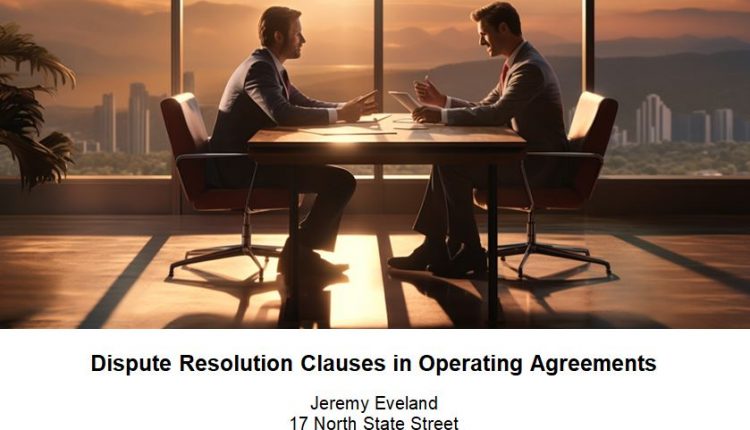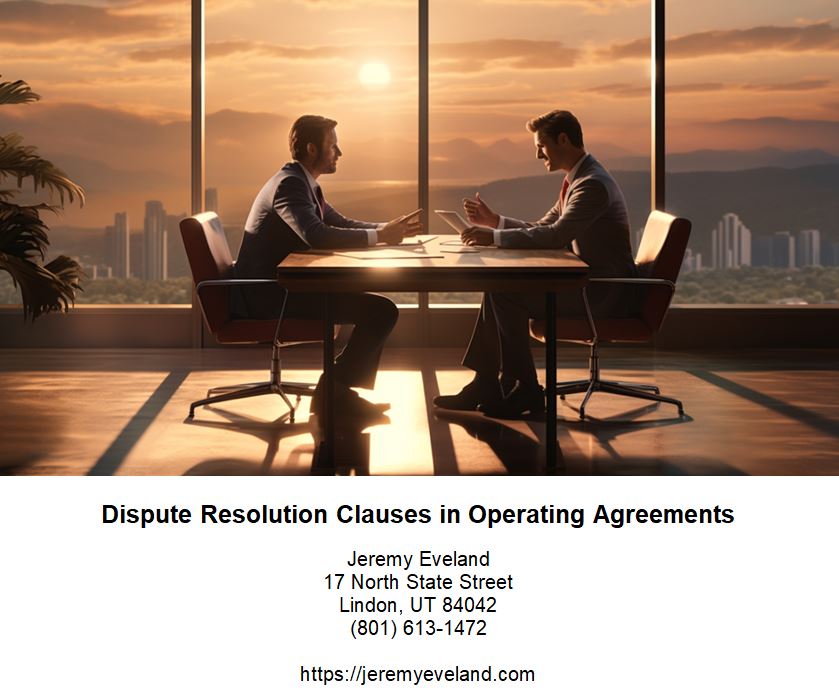Dispute Resolution Clauses in Operating Agreements
Are you a business owner looking to protect your interests and avoid costly legal battles? Look no further than dispute resolution clauses in operating agreements. These essential components outline the procedures for resolving conflicts between owners, ensuring fair and efficient resolutions. Whether it's mediation, arbitration, or litigation, the choice of method is crucial. By including a well-drafted clause in your agreement, you can navigate disputes effectively and maintain positive relationships with fellow owners. So let's delve into the world of dispute resolution clauses and learn how they can benefit your business.
| Dispute Resolution Mechanism | Description |
|---|---|
| Arbitration Clause | Involves appointing a neutral third party (an arbitrator) who listens to both sides and makes a binding decision. This process can be faster and more cost-effective than going to court. |
| Mediation | Involves a neutral third party (a mediator) who facilitates communication between parties and helps them reach a mutually agreeable solution. Unlike arbitration, mediation is non-binding, meaning the parties involved have control over the outcome and can choose whether or not to accept any proposed resolutions. |
Factors to Consider When Drafting a Dispute Resolution Clause
When drafting a dispute resolution clause, you'll want to consider the specific needs and preferences of your business, as well as the potential complexity of future conflicts. Dispute resolution clauses are an essential part of operating agreements, as they outline how disputes between parties will be resolved. It is important to carefully consider various factors when drafting a dispute resolution clause to ensure its effectiveness.
One of the key factors to consider is the type of dispute resolution mechanism that best suits your business. There are several options available, such as mediation, arbitration, or litigation. Each mechanism has its own advantages and disadvantages, so it's crucial to choose one that aligns with your goals and objectives.
Another factor to consider is the level of detail you include in the clause. A well-drafted dispute resolution clause should clearly define the process for resolving disputes, including timelines, procedures, and any applicable rules or guidelines. By providing clear instructions upfront, you can minimize confusion and potential disagreements later on.
Additionally, it's important to think about enforceability when drafting a dispute resolution clause. Consider whether you want to include provisions that require parties to participate in alternative dispute resolution before resorting to litigation. This can help encourage cooperation and reduce costs associated with court proceedings.
In conclusion, when drafting a dispute resolution clause for your operating agreement, it's crucial to carefully consider factors such as the type of mechanism used, level of detail included in the clause, and enforceability provisions. By doing so, you can create an effective and efficient process for resolving disputes within your business.
Now let's explore some best practices for enforcing dispute resolution clauses…
Best Practices for Enforcing Dispute Resolution Clauses
To effectively enforce dispute resolution clauses, it's important to clearly outline the process and provide specific guidelines. This ensures that all parties involved understand their rights and obligations when it comes to resolving disputes within the context of operating agreements. Here are some best practices for enforcing dispute resolution clauses:
-
Clearly define the process: Clearly outline the steps that must be followed when a dispute arises, including any required notices and timelines. This clarity helps avoid confusion and potential delays in resolving conflicts.
-
Choose an appropriate forum: Select a forum or method for resolving disputes that is contextually relevant to your business. Consider factors such as cost, expertise, and time efficiency when deciding whether to use mediation, arbitration, or litigation.
-
Include provisions for sanctions: Include provisions in the clause that allow for sanctions or penalties if one party fails to comply with the agreed-upon dispute resolution process. This can serve as a deterrent against non-compliance.
-
Regularly review and update: It's essential to regularly review and update your dispute resolution clauses as needed. As your business evolves, so too may your needs in resolving disputes effectively.
Case Studies: Successful Dispute Resolution in Operating Agreements
By examining real-life examples, you can gain insight into how effective dispute resolution strategies have resolved conflicts within operating agreements. In the context of business, operating agreements are crucial documents that outline the rights and responsibilities of business owners. They often contain dispute resolution clauses that provide a roadmap for resolving internal conflicts in a fair and efficient manner.
To illustrate the power of these clauses, let's explore some case studies where successful dispute resolutions were achieved through well-crafted operating agreements:
| Case Study | Description | Dispute Resolution Strategy |
|---|---|---|
| XYZ Company v. ABC Corp. | Disagreement over profit distribution | Mediation followed by binding arbitration |
| Acme LLC v. Smith & Co. | Ownership dispute after partner departure | Expert determination |
| Widget Inc. v. Global Enterprises | Breach of contract regarding intellectual property rights | Negotiation with assistance from legal counsel |
These case studies highlight the importance of contextually relevant dispute resolution strategies within operating agreements. By tailoring these clauses to specific circumstances, businesses can avoid costly litigation and find mutually beneficial solutions to their disputes.
Frequently Asked Questions
What Are the Potential Consequences of Not Including a Dispute Resolution Clause in an Operating Agreement?
Not including a dispute resolution clause in an operating agreement could lead to prolonged conflicts, costly litigation, and damage to the relationship between business owners. It is crucial to address potential disputes preemptively.
Can a Dispute Resolution Clause Be Modified or Amended After It Has Been Included in an Operating Agreement?
Yes, you can modify or amend a dispute resolution clause in an operating agreement. It's amazing how a simple change in wording can make all the difference in resolving conflicts efficiently and effectively.
Are There Any Specific Legal Requirements or Guidelines That Need to Be Followed When Drafting a Dispute Resolution Clause?
When drafting a dispute resolution clause, it is crucial to adhere to specific legal requirements and guidelines. These ensure that the clause is effective and enforceable in resolving conflicts between parties.
How Long Does the Dispute Resolution Process Typically Take, and What Factors Can Affect Its Duration?
The duration of the dispute resolution process varies, depending on factors like complexity, willingness to negotiate, and availability of parties involved. It can take weeks or even months to reach a resolution.
Can a Dispute Resolution Clause Be Enforced if One Party Refuses to Participate in the Chosen Mechanism?
Yes, a dispute resolution clause can be enforced if one party refuses to participate in the chosen mechanism. However, the specific enforcement process will depend on the language of the clause and applicable laws.
Areas We Serve
We serve individuals and businesses in the following locations:
Salt Lake City Utah
West Valley City Utah
Provo Utah
West Jordan Utah
Orem Utah
Sandy Utah
Ogden Utah
St. George Utah
Layton Utah
South Jordan Utah
Lehi Utah
Millcreek Utah
Taylorsville Utah
Logan Utah
Murray Utah
Draper Utah
Bountiful Utah
Riverton Utah
Herriman Utah
Spanish Fork Utah
Roy Utah
Pleasant Grove Utah
Kearns Utah
Tooele Utah
Cottonwood Heights Utah
Midvale Utah
Springville Utah
Eagle Mountain Utah
Cedar City Utah
Kaysville Utah
Clearfield Utah
Holladay Utah
American Fork Utah
Syracuse Utah
Saratoga Springs Utah
Magna Utah
Washington Utah
South Salt Lake Utah
Farmington Utah
Clinton Utah
North Salt Lake Utah
Payson Utah
North Ogden Utah
Brigham City Utah
Highland Utah
Centerville Utah
Hurricane Utah
South Ogden Utah
Heber Utah
West Haven Utah
Bluffdale Utah
Santaquin Utah
Smithfield Utah
Woods Cross Utah
Grantsville Utah
Lindon Utah
North Logan Utah
West Point Utah
Vernal Utah
Alpine Utah
Cedar Hills Utah
Pleasant View Utah
Mapleton Utah
Stansbury Par Utah
Washington Terrace Utah
Riverdale Utah
Hooper Utah
Tremonton Utah
Ivins Utah
Park City Utah
Price Utah
Hyrum Utah
Summit Park Utah
Salem Utah
Richfield Utah
Santa Clara Utah
Providence Utah
South Weber Utah
Vineyard Utah
Ephraim Utah
Roosevelt Utah
Farr West Utah
Plain City Utah
Nibley Utah
Enoch Utah
Harrisville Utah
Snyderville Utah
Fruit Heights Utah
Nephi Utah
White City Utah
West Bountiful Utah
Sunset Utah
Moab Utah
Midway Utah
Perry Utah
Kanab Utah
Hyde Park Utah
Silver Summit Utah
La Verkin Utah
Morgan Utah
Estate Attorney Consultation
When you need help from an Lawyer in Utah, call Jeremy D. Eveland, MBA, JD (801) 613-1472 for a consultation.
Jeremy Eveland
17 North State Street
Lindon UT 84042
(801) 613-1472
Related Posts
How To Handle Customer Complaints In Utah
Business Lawyer Saratoga Springs Utah
The Role of Business Law in Protecting Minority Shareholder Rights
What Are The 4 Different Types of Business Law?
Business Lawyer Washington Utah
Business Lawyer South Salt Lake Utah
Legal Requirements for Utah Technology Startups
Business Lawyer Farmington Utah
Due Diligence For Buying A Utah Business
Understanding Utah’s Labor Laws
Business Lawyer North Salt Lake Utah
Product Liability Laws in Utah
Preventing Cybersecurity Breaches
Business Lawyer North Ogden Utah
Business Lawyer Brigham City Utah
Mastering Business Law: Key Essentials For Success
Business Lawyer Centerville Utah
Shareholder Agreements in Utah
Business Lawyer Hurricane Utah
Corporate Attorney West Jordan UT
Estate Planning For Survivorship Considerations



Comments are closed.